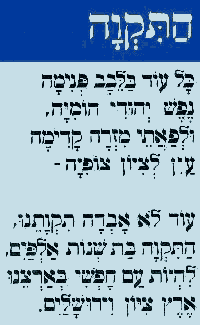Hatikvah -- "The Hope" Israel's National Anthem

Transliteration:
Kol od balevav p'nimah
Nefesh Yehudi homiyah
Ulfa'atey mizrach kadimah
Ayin l'tzion tzofiyah
Od lo avdah tikvatenu
Hatikvah bat shnot alpayim
L'hiyot am chofshi b'artzenu
Eretz Tzion v'Yerushalayim
Translation:
As long as deep in the heart,
The soul of a Jew yearns,
And forward to the East
To Zion, an eye looks
Our hope will not be lost,
The hope of two thousand years,
To be a free nation in our land,
The land of Zion and Jerusalem.
The title of the national anthem, Hatikvah, means “The Hope.” It was written by Naftali Herz Imber (1856-1909), who moved to Palestine in 1882 from Galicia. The melody was arranged by Samuel Cohen, an immigrant from Moldavia, from a musical theme in Smetana's "Moldau" that is based on an an old Modavian-Rumanian folk song. This moving song was adopted as the anthem of the Zionist movement. The song was well suited to the Zionist cause, and was sung in settlements throughout Eretz Yisroel, as well as Zionist congresses.
Hatikva expresses the hope of the Jewish people, that they would someday return to the land of their forefathers as prophesied in the Torah. The Jewish people were exiled from Israel in 70 B.C.E. by the Roman army led by Titus who destroyed the Temple in Jerusalem. During the two thousand years of exile, the Jewish people said special daily prayers for return to Israel while facing the East in the direction of Jerusalem. They continued to celebrate the Jewish holidays according to the seasons and calendar. Zion is synonymous with Israel and Jerusalem, and now that Israel has become a State, this hope has become a reality. At the declaration of the State of Israel on May 14, 1948, Hatikvah was sung in the opening ceremony and played by the Palestine Symphony Orchestra.
Kol od balevav p'nimah
Nefesh Yehudi homiyah
Ulfa'atey mizrach kadimah
Ayin l'tzion tzofiyah
Od lo avdah tikvatenu
Hatikvah bat shnot alpayim
L'hiyot am chofshi b'artzenu
Eretz Tzion v'Yerushalayim
Translation:
As long as deep in the heart,
The soul of a Jew yearns,
And forward to the East
To Zion, an eye looks
Our hope will not be lost,
The hope of two thousand years,
To be a free nation in our land,
The land of Zion and Jerusalem.
The title of the national anthem, Hatikvah, means “The Hope.” It was written by Naftali Herz Imber (1856-1909), who moved to Palestine in 1882 from Galicia. The melody was arranged by Samuel Cohen, an immigrant from Moldavia, from a musical theme in Smetana's "Moldau" that is based on an an old Modavian-Rumanian folk song. This moving song was adopted as the anthem of the Zionist movement. The song was well suited to the Zionist cause, and was sung in settlements throughout Eretz Yisroel, as well as Zionist congresses.
Hatikva expresses the hope of the Jewish people, that they would someday return to the land of their forefathers as prophesied in the Torah. The Jewish people were exiled from Israel in 70 B.C.E. by the Roman army led by Titus who destroyed the Temple in Jerusalem. During the two thousand years of exile, the Jewish people said special daily prayers for return to Israel while facing the East in the direction of Jerusalem. They continued to celebrate the Jewish holidays according to the seasons and calendar. Zion is synonymous with Israel and Jerusalem, and now that Israel has become a State, this hope has become a reality. At the declaration of the State of Israel on May 14, 1948, Hatikvah was sung in the opening ceremony and played by the Palestine Symphony Orchestra.


